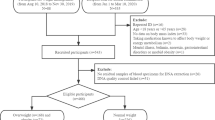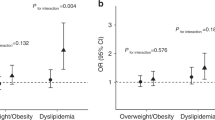Abstract
Background:
The 11β-hydroxysteroid dehydrogenase type 1 (11β-HSD1) enzyme catalyses the regeneration of active cortisol from inert cortisone and plays a critical role in tissue-specific corticosteroid reactions; therefore, 11β-HSD1 is a key molecule associated with the development of obesity. Despite evidence for its role in obesity, no genetic polymorphisms have been significantly associated with the disease per se.
Objective:
The aim of this study was to evaluate whether HSD11B1 gene variants, which have never been studied before, are associated with obesity and its related traits, as well as its relation to biomarkers of inflammation, liver damage and cardiovascular disease in a cohort of Spanish children.
Design:
We performed a prospective case–control study.
Subjects:
A total of 534 children were examined and classified as being obese (n=292) or normal weight (n=242). Anthropometric and biochemical measurements related to obesity, including inflammation, liver damage and cardiovascular disease, were determined. Genomic DNA was extracted and 10 HSD11B1 gene single-nucleotide polymorphisms (SNPs) were genotyped.
Results:
A novel SNP, rs3753519, was strongly associated with obesity and this SNP was the only statistically significant HSD11B1 gene SNP remaining after a Bonferroni correction (odds ratio=1.97 for allelic effect, 95% confidence interval 1.23–3.16; P=0.004 and Bonferroni corrected P=0.046). In addition, this SNP was significantly and positively associated with increased body mass index (BMI), BMI z-score, weight, waist circumference, plasma γ-glutamyl transpeptidase and plasma active plasminogen activator inhibitor 1. The SNP was negatively associated with plasma adiponectin and cortisol after adjusting for sex and age. None of the inflammation biomarkers tested were associated with the risk allele.
Conclusion:
These data, which link an HSD11B1 genotype with both disease prevalence and its related phenotypes, strongly support a role for the rs3753519 polymorphism in the pathogenesis of pediatric-onset obesity.
This is a preview of subscription content, access via your institution
Access options
Subscribe to this journal
Receive 12 print issues and online access
$259.00 per year
only $21.58 per issue
Buy this article
- Purchase on Springer Link
- Instant access to full article PDF
Prices may be subject to local taxes which are calculated during checkout
Similar content being viewed by others
References
Stewart PM, Krozowski ZS . 11 beta-Hydroxysteroid dehydrogenase. Vitam Horm 1999; 57: 249–324.
Staab CA, Maser E . 11beta-Hydroxysteroid dehydrogenase type 1 is an important regulator at the interface of obesity and inflammation. J Steroid Biochem Mol Biol 2010; 119: 56–72.
Morton NM . Obesity and corticosteroids: 11beta-hydroxysteroid type 1 as a cause and therapeutic target in metabolic disease. Mol Cell Endocrinol 2010; 316: 154–164.
Anagnostis P, Athyros VG, Tziomalos K, Karagiannis A, Mikhailidis DP . Clinical review: the pathogenetic role of cortisol in the metabolic syndrome: a hypothesis. J Clin Endocrinol Metab 2009; 94: 2692–2701.
Stewart PM, Boulton A, Kumar S, Clark PMS, Shackleton CHL . Cortisol metabolism in human obesity: impaired cortisone--cortisol conversion in subjects with central adiposity. J Clin Endocrinol Metab 1999; 84: 1022–1027.
Rask E, Olsson T, Soderberg S, Andrew R, Livingstone DE, Johnson O et al. Tissue-specific dysregulation of cortisol metabolism in human obesity. J Clin Endocrinol Metab 2001; 86: 1418–1421.
Simonyte K, Rask E, Näslund I, Angelhed JE, Lönn L, Olsson T et al. Obesity is accompanied by disturbances in peripheral glucocorticoid metabolism and changes in FA recycling. Obesity 2009; 17: 1982–1987.
Sandeep TC, Andrew R, Homer NZ, Andrews RC, Smith K et al. Increased in vivo regeneration of cortisol in adipose tissue in human obesity and effects of the 11beta-hydroxysteroid dehydrogenase type 1 inhibitor carbenoxolone. Diabetes 2005; 54: 872–879.
Paulmyer-Lacroix O, Boullu S, Oliver C, Alessi MC, Grino M . Expression of the mRNA coding for 11beta-hydroxysteroid dehydrogenase type 1 in adipose tissue from obese patients: an in situ hybridization study. J Clin Endocrinol Metab 2002; 87: 2701–2705.
Paulsen SK, Pedersen SB, Fisker S, Richelsen B . 11Beta-HSD type 1 expression in human adipose tissue: impact of gender, obesity, and fat localization. Obesity 2007; 15: 1954–1960.
Mericq V, Medina P, Kakarieka E, Márquez L, Johnson MC, Iñiguez G . Differences in expression and activity of 11beta-hydroxysteroid dehydrogenase type 1 and 2 in human placentas of term pregnancies according to birth weight and gender. Eur J Endocrinol 2009; 161: 419–425.
Masuzaki H, Paterson J, Shinyama H, Morton NM, Mullins JJ, Seckl JR et al. A transgenic model of visceral obesity and the metabolic syndrome. Science 2001; 294: 2166–2170.
Kotelevtsev Y, Holmes MC, Burchell A, Houston PM, Schmoll D, Jamieson P et al. 11-Hydroxysteroid dehydrogenase type 1 knockout mice show attenuated glucocorticoid inducible responses and resist hyperglycaemia on obesity or stress. Proc Natl Acad Sci USA 1997; 94: 14924–14929.
Morton NM, Holmes MC, Fiévet C, Staels B, Tailleux A, Mullins JJ et al. Improved lipid and lipoprotein profile, hepatic insulin sensitivity, and glucose tolerance in 11-hydroxysteroid dehydrogenase type 1 null mice. J Biol Chem 2001; 276: 41293–41300.
Morton NM, Paterson JM, Masuzaki H, Holmes MC, Staels B, Fievet C et al. Novel adipose tissue-mediated resistance to diet-induced visceral obesity in 11-hydroxysteroid dehydrogenase type 1-deficient mice. Diabetes 2004; 53: 931–938.
Alberts P, Nilsson C, Selen G, Engblom LO, Edling NH, Norling S et al. Selective inhibition of 11-hydroxysteroid dehydrogenase type 1 improves hepatic insulin sensitivity in hyperglycemic mice strains. Endocrinology 2003; 144: 4755–4762.
Nair S, Lee YH, Lindsay RS, Walker BR, Tataranni PA, Bogardus C et al. 11-Hydroxysteroid dehydrogenase type 1: genetic polymorphisms are associated with type 2 diabetes in Pima Indians independently of obesity and expression in adipocyte and muscle. Diabetologia 2004; 47: 1088–1095.
Franks PW, Knowler WC, Nair S, Koska J, Lee YH, Lindsay RS et al. Interaction between an 11HSD1 gene variant and birth era modifies the risk of hypertension in Pima Indians. Hypertension 2004; 44: 681–688.
Miyamoto Y, Morisaki H, Yamanaka I, Kokubo Y, Masuzaki H, Okayama A et al. Association study of 11beta-hydroxysteroid dehydrogenase type 1 gene polymorphisms and metabolic syndrome in urban Japanese cohort. Diabetes Res Clin Pract 2009; 85: 32–38.
Gelernter-Yaniv L, Feng N, Sebring NG, Hochberg Z, Yanovski JA . Associations between a polymorphism in the 11 beta hydroxysteroid dehydrogenase type I gene and body composition. Int J Obes Relat Metab Disord 2003; 27: 983–986.
Cole TJ, Bellizzi MC, Flegal KM, Dietz WH . Establishing a standard definition for child overweight and obesity worldwide: international survey. BMJ 2000; 320: 1240–1243.
Gil-Campos M, Ramírez Tortosa MC, Aguilera CM, Cañete R, Gil A . Fasting and postprandial adiponectin alterations anticipate NEFA and TNF-α changes in prepubertal obese children. Nutr Metab Cardiovasc Dis 2011; 21: 62–68.
Bruley C, Lyons V, Worsley AG, Wilde MD, Darlington GD, Morton NM et al. A novel promoter for the 11- hydroxysteroid dehydrogenase type 1 gene is active in lung and is C/EBP independent. Endocrinology 2006; 147: 2879–2885.
Staab CA, Stegk JP, Haenisch S, Neiß E, Köbsch K, Ebert B et al. Analysis of alternative promoter usage in expression of HSD11B1 including the development of a transcript-specific quantitative real-time PCR method. Chem Biol Interact 2011; 191: 104–112.
Morales MA, Carvajal CA, Ortiz E, Mosso LM, Artigas RA, Owen GI et al. Possible pathogenetic role of 11-hydroxysteroid dehydrogenase type 1 (11HSD1) gene polymorphisms in arterial hypertension. Rev Med Chil 2008; 136: 701–710.
Draper N, Walker EA, Bujalska IJ, Tomlinson JW, Chalder SM, Arlt W et al. Mutations in the genes encoding 11-hydroxysteroid dehydrogenase type 1 and hexose-6-phosphate dehydrogenase interact to cause cortisone reductase deficiency. Nat Genet 2003; 34: 434–439.
Malavasi EL, Kelly V, Nath N, Gambineri A, Dakin RS, Pagotto U et al. Functional effects of polymorphisms in the human gene encoding 11 beta-hydroxysteroid dehydrogenase type 1 (11 beta-HSD1): a sequence variant at the translation start of 11 beta-HSD1 alters enzyme levels. Endocrinology 2010; 151: 195–202.
Wiegand S, Richardt A, Remer T, Wudy SA, Tomlinson JW, Hughes B et al. Reduced 11beta-hydroxysteroid dehydrogenase type 1 activity in obese boys. Eur J Endocrinol 2007; 157: 319–324.
Hellman L, Nakada F, Curti J, Weitzman ED, Kream J, Roffwarg H et al. Cortisol is secreted episodically by normal man. J Clin Endocrinol Metab 1970; 30: 411–422.
Salehi M, Ferenczi A, Zumoff B . Obesity and cortisol status. Horm Metab Res 2005; 37: 193–197.
Acknowledgements
We thank the children and parents who participated in the study. This work was supported by the Plan Nacional de Investigación Científica, Desarrollo e Innovación Tecnológica (I+D+I), Instituto de Salud Carlos III-Fondo de Investigación Sanitaria (PI020826, PI051968), the Consejería de Innovación y Ciencia, Junta de Andalucía (P06-CTS 2203) and the Ministerio de Universidades y Tecnología, Instituto de Salud Carlos III, Fondo de Investigaciones Sanitarias, Redes temáticas de investigación cooperativa RETIC (Red SAMID RD08/0072/0028).
Author information
Authors and Affiliations
Corresponding author
Ethics declarations
Competing interests
The authors declare no conflict of interest.
Rights and permissions
About this article
Cite this article
Olza, J., Gil-Campos, M., Leis, R. et al. A gene variant of 11β-hydroxysteroid dehydrogenase type 1 is associated with obesity in children. Int J Obes 36, 1558–1563 (2012). https://doi.org/10.1038/ijo.2012.4
Received:
Revised:
Accepted:
Published:
Issue Date:
DOI: https://doi.org/10.1038/ijo.2012.4



